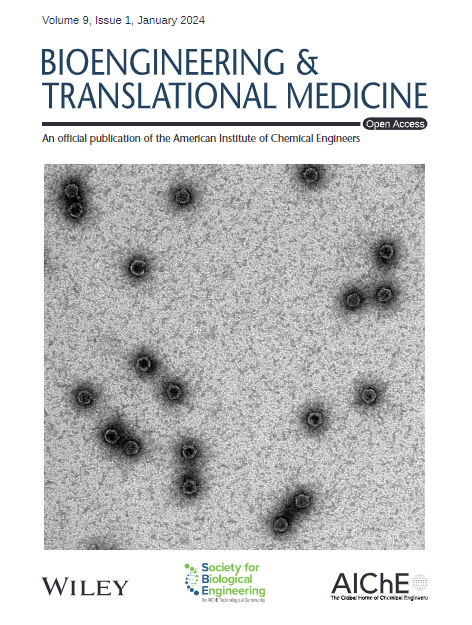Engineered probiotic alleviates ulcerative colitis by inhibiting M1 macrophage polarization via glycolytic reprogramming
IF 5.7
2区 医学
Q1 ENGINEERING, BIOMEDICAL
引用次数: 0
Abstract
Ulcerative colitis (UC) remains a significant therapeutic challenge due to its complex pathogenesis involving oxidative stress, immune dysregulation, and gut microbiota dysbiosis. Melanin, a natural biopolymer with robust anti‐inflammatory and antioxidant properties, presents a promising treatment avenue for UC. Probiotics, particularly工程益生菌通过糖酵解重编程抑制M1巨噬细胞极化,减轻溃疡性结肠炎
溃疡性结肠炎(UC)由于其复杂的发病机制涉及氧化应激、免疫失调和肠道微生物群失调,仍然是一个重大的治疗挑战。黑色素是一种具有抗炎和抗氧化特性的天然生物聚合物,是UC治疗的一个很有前景的途径。益生菌,特别是大肠杆菌Nissle 1917 (EcN),因其在恢复肠道稳态中的作用而得到认可。在这项研究中,我们对EcN进行基因工程改造,使其过表达酪氨酸酶(EcN‐T),促进黑色素的生物合成,专门用于UC治疗。与单独使用黑色素或EcN相比,工程益生菌显示出更好的治疗效果,突出了协同效应。EcN‐T不仅具有清除活性氧和恢复肠道菌群的显著能力,而且具有延长肠道定殖时间的特性,从而延长给药频率。此外,EcN - T显示了新的机制,如肠粘膜屏障的恢复和短链脂肪酸水平的升高。此外,EcN‐T通过缺氧诱导因子1‐α (HIF‐1α)依赖性糖酵解重编程抑制M1巨噬细胞极化,强调其免疫调节潜力。总的来说,这些发现为EcN - T治疗UC的治疗潜力提供了新的见解,提供了一种新的策略,可以提高治疗效果,同时潜在地减少与传统疗法相关的副作用。
本文章由计算机程序翻译,如有差异,请以英文原文为准。
求助全文
约1分钟内获得全文
求助全文
来源期刊

Bioengineering & Translational Medicine
Pharmacology, Toxicology and Pharmaceutics-Pharmaceutical Science
CiteScore
8.40
自引率
4.10%
发文量
150
审稿时长
12 weeks
期刊介绍:
Bioengineering & Translational Medicine, an official, peer-reviewed online open-access journal of the American Institute of Chemical Engineers (AIChE) and the Society for Biological Engineering (SBE), focuses on how chemical and biological engineering approaches drive innovative technologies and solutions that impact clinical practice and commercial healthcare products.
 求助内容:
求助内容: 应助结果提醒方式:
应助结果提醒方式:


